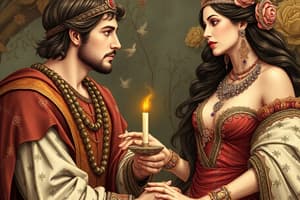Podcast
Questions and Answers
What was the main reason for the end of Greek influence in the Mediterranean region?
What was the main reason for the end of Greek influence in the Mediterranean region?
- The decline of Greek trade and economic power.
- The spread of Roman culture and language throughout the region.
- The defeat of the Greek armies by the Romans in the Punic Wars.
- The death of Cleopatra and Mark Antony, leading to the rise of Roman power. (correct)
What role did the Roman army play in the development of the Roman empire?
What role did the Roman army play in the development of the Roman empire?
- It was a source of manpower for the agricultural and construction industries, contributing to the empire's economic prosperity.
- It was primarily used to suppress rebellions and maintain the power of the emperors.
- It primarily protected the empire, but had no other significant impact on its growth.
- It was responsible for fighting wars, building roads and infrastructure, and maintaining order within the empire. (correct)
How did the Roman government system change over time, particularly in relation to the Plebeians?
How did the Roman government system change over time, particularly in relation to the Plebeians?
- The Plebeians lost most of their rights as the Roman Republic transitioned into an empire.
- The Plebeians remained a subordinate class, despite some minor concessions granted by the Patricians.
- The Plebeians gradually gained more power and influence, eventually becoming equal in status to the Patricians. (correct)
- The Roman government system ultimately favored the Patricians, completely excluding the Plebeians from any real power.
What key contribution did Augustus make to the Roman Empire?
What key contribution did Augustus make to the Roman Empire?
What was the purpose of the Twelve Tables in ancient Rome?
What was the purpose of the Twelve Tables in ancient Rome?
Which of the following best describes the Pax Romana?
Which of the following best describes the Pax Romana?
Which of these options was NOT one of the main gods that the ancient Roman people worshipped?
Which of these options was NOT one of the main gods that the ancient Roman people worshipped?
What was the main reason for Julius Caesar's assassination?
What was the main reason for Julius Caesar's assassination?
Flashcards
Mark Antony
Mark Antony
A Roman general who allied with Cleopatra for power.
Cleopatra
Cleopatra
The queen of Egypt who partnered with Mark Antony.
Octavian
Octavian
Adopted son of Julius Caesar, later known as Augustus.
Pax Romana
Pax Romana
Signup and view all the flashcards
Roman Army
Roman Army
Signup and view all the flashcards
Patricians
Patricians
Signup and view all the flashcards
Plebeians
Plebeians
Signup and view all the flashcards
Aqueducts
Aqueducts
Signup and view all the flashcards
Study Notes
Antony and Cleopatra
- Antony was a Roman general.
- Cleopatra was the queen of Egypt.
- They allied for power.
- Antony and Cleopatra lost a battle to Octavian in 31 BCE.
- They committed suicide in 30 BCE.
- Their defeat ended Greek influence and helped Octavian gain control of Rome.
Octavian/Augustus
- Octavian was Julius Caesar's adopted son.
- He allied with Antony and Lepidus to fight Caesar's enemies.
- Octavian defeated Antony and became Rome's leader.
- He took the title "Augustus".
- He was Rome's first emperor.
- He strengthened the government.
- He expanded the empire.
- He started the Pax Romana.
Pax Romana
- Pax Romana means "Roman Peace."
- It was a period of peace and prosperity lasting approximately 200 years (27 BCE – 180 CE).
- Important emperors included Augustus, Trajan, and Hadrian.
- They expanded the empire and improved cities.
Roman Architecture
- Romans used arches, vaults, and concrete for strong structures.
- The Colosseum was a large arena for gladiatorial contests.
- Trajan's Column featured carvings depicting Emperor Trajan's battles.
- The Pantheon was a temple dedicated to all Roman gods, notable for its large dome.
Military & Provinces
- The Roman army protected the empire and built roads and buildings.
- Roads facilitated travel and trade.
- Forts protected Rome's borders.
- Aqueducts supplied cities with fresh water.
The Rise of the Republic
- The Roman government included a Senate which advised leaders.
- Consuls led the government.
- Assemblies made laws.
- Patricians were wealthy citizens.
- Plebeians were common people.
- Plebeians fought for and gained more rights, including the Tribune position.
Daily Life in Rome
- Romans worshipped many gods, with Jupiter being the primary deity.
- Festivals and rituals were important.
- The Colosseum hosted gladiatorial contests.
- Chariot races took place in the Circus Maximus.
- The Twelve Tables were Rome's first written laws, which protected citizens' rights.
Julius Caesar
- Caesar won battles and expanded Rome.
- He implemented reforms benefiting the people.
- He was considered a beloved hero and powerful leader by some, but feared by others.
- Caesar was assassinated on March 15, 44 BCE.
- Caesar's assassination led to a civil war and Octavian's rise to power.
Key Terms
- Pax Romana: A period of peace and prosperity.
- Patricians & Plebeians: The rich and poor classes.
- Aqueducts: Water systems.
- Gladiators: Fighters in the Colosseum.
- Roman Senate: A governing body in the Republic.
Study Tips
- Review important facts.
- Use flashcards for key terms and people.
- Study with friends.
- Create a timeline focusing on Caesar and Augustus.
Studying That Suits You
Use AI to generate personalized quizzes and flashcards to suit your learning preferences.


